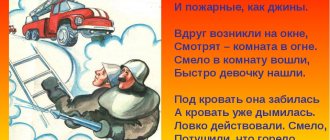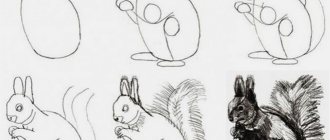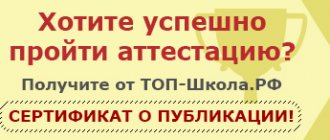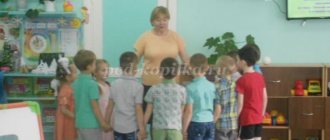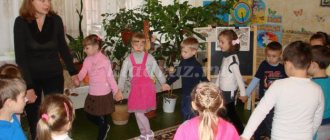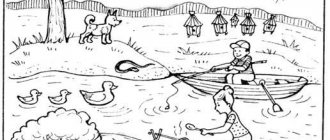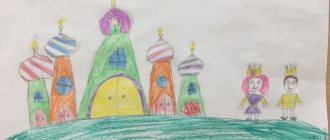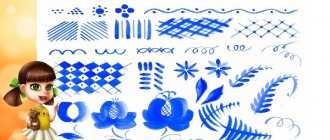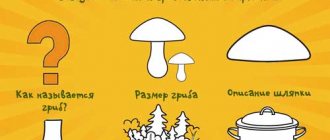Summary of an integrated lesson in the preparatory group on the topic: Winter
Summary of an integrated lesson for children 6-7 years old: “Zimushka - winter”
Hello, winter - winter, you brought the birds to visit us
Author: Efimova Alla Ivanovna, teacher of GBDOU No. 43, Kolpino St. Petersburg
Description: This summary will be of interest to preschool teachers, additional education teachers and parents. Designed for children of older preschool age. Goal: expanding and systematizing children’s knowledge about winter. Tasks: - expand and activate the vocabulary on the topic “Winter”; - develop the ability to maintain a conversation, select words and adjectives; develop attention, observation, fine motor skills; — to cultivate love and respect for nature, a sense of kindness, empathy for everything living and beautiful, to cultivate the ability to work in pairs; - development of emotional perception in children, create a joyful mood in children, create a desire to participate in games, enjoy winter, winter games; - practice writing sentences and stories based on the picture. Preliminary work: conversation about the signs of winter; viewing winter landscapes, pictures of animals and birds; guessing riddles, reading poems, stories and fairy tales on a winter theme; making bird feeders. Preparation for the lesson: sheets of white cardboard with printed bird patterns, glue, cereals (millet, rice, buckwheat), brushes, napkins.
Educator: Guys, you probably noticed that something has changed in our locker room? Have you noticed these changes, tell me about them? Children's answers: A lot of beautiful paintings appeared, and each child has a small but very beautiful picture on his locker. Educator: Correct. How do you think these paintings are interconnected? Answers: All the pictures show winter.
Educator: Correct. But it’s not for nothing that I decorated your cabinets with such beautiful pictures. Over the course of a week, you carefully examine your picture, study it, and then describe it to me in detail (or rather, tell me what you saw in it). On the weekend, you can ask your parents to help you write a short story about your painting, or write it yourself (after all, most children already write themselves), supplement it with your own drawing. This will be your homework. Our group is also decorated with paintings on the theme - winter. I invite you to describe this wonderful time. Children's answers. Educator: You are all great fellows, you said so many wonderful words about this wonderful time, I want to invite you to guess the riddles. - There are four brothers, each of them has three months. What kind of brothers are these? (seasons) - Covers everything with a snow-white blanket. What time of year? (winter) - This month welcomes winter, the New Year holiday invites us. (December) - He is the owner of the forest, He loves honey, and sleeps in winter. (bear) - He is always very nimble, He has a beard. He crawls into our felt boots, and our noses freeze. He even pinches our cheeks, Who is this... (frost) - Falls beautifully from the sky, And dances on the fly. It sits in the palm of our hand, and immediately turns into water. (snow) - A small animal, Loves carrots, jumps deftly. Changes color, and his name is...(bunny) - The people rejoice, When...(winter) comes to us. — The granddaughter who always goes with Grandfather? (Snow Maiden) Educator: Do you know winter fun? Which?
Children's answers. Educator: I invite you to the rug, I’m starting some winter fun. “Winter Games” The children began to ride (hold your palms horizontally in front of your chest and make movements back and forth, as if skiing), and tumble in the snow (make synchronized circular movements with your hands in front of your chest: with your right hand clockwise, and with your left hand counterclock-wise). They wanted to play snowballs (move the “snowball” from one palm to the other) They began to sculpt them and throw them at each other (“make” a snowball, and then pretend to “throw” it at someone). They began to roll snowballs (imitate the corresponding movements) - sculpt a snow woman (from the bottom up with both hands, simultaneously draw three snowballs standing on top of each other: large, medium and small) Fun in the winter! I don't want to go home! Educator: We rested a little. Guys, tell me what winter is like? Answers: snowy, cold, cheerful, blizzard, blizzard, frosty, snow-white, harsh, silver, beautiful, beloved, etc. Educator: That's right, and now the game is the other way around. You described winter in such beautiful long words, but now it’s the other way around. The word winter is long, and short is winter. Snezhnaya... – snow; Vyzhnaya... - Vga; Blizzard... - blizzard; Frosty... - frost; etc. Educator: Now I’ll start the sentences, and you finish. — In winter, the branches of the trees... are covered with snow. - Houses, forests, paths... are covered in snow. — The bear in winter...hibernates. — Children love...to play in the snow. — Rivers in winter... become covered with ice. — We hide our hands from the cold in mittens. — White snowflakes are swirling in the air. - The bunny changes... the color of his fur coat. — In winter, the nights are long, ... the days are short. — We dress warmly... so as not to freeze. — Birds fly away... to warmer climes. Educator: guys, let's remember our little friends. Remember the birds that fly to warm countries, why they fly there and tell me about the birds that live with us in winter. What do they eat, how do they live?
Children's answers. Educator: Well done. Listen to a poem about birds. New Year's carnival. Do you know that miracles happen in winter? That in the forest on New Year's Eve, all the birds are collected? Good Grandfather Frost gives out gifts. Some people ask for a handful of grains, others for bright feathers. Having listened to the requests, Frost reasons wisely: “You need to survive the winter, find food in the morning.” And he carefully gives the little beggars a very modest outfit, there are no scarlet feathers in it. Santa Claus tries to decorate only those who live far from villages and eat in the forest. And the Woodpeckers, Hazel Grouse, and Crossbills are happy and cheerful. How good they are, in the feathers of their dreams! And the most beautiful and wonderful of all, little King. With the proud air of an autocrat, he sits down on a tree stump. The fun begins, the New Year's carnival. So much joy and laughter! It's a pity you weren't there. (Batuy Irina) Educator: A beautiful poem, isn’t it? Let us be Santa Clauses for our little friends today and give them small gifts with our own hands. These will be feeders for friends. But first, I suggest you prepare our hands and fingers. Finger gymnastics: We are friends in our group - girls and boys connect their fingers. - to the castle (several times) You and I will make friends Little fingers. One, two, three, four, five - fingers from the little finger alternately. We begin to count. - connect with each other One, two, three, four, five We’ve finished counting (Hands down, shake hands) Sit down at your workstations, in front of you are leaves with pictures of birds, I suggest you paste over our birds with different cereals. After completing our work, we will take our gifts - feeders outside and treat the birds. I turn on calm music, the children begin to do their work, and whoever needs help, I help. Educator: Our time is coming to an end, we are slowly finishing our work, cleaning up our workplaces... What wonderful feeders they turned out to be, I’m sure the birds will be very happy. Well done everyone. And now I suggest going for a walk and taking our feeders with you.
Educator: They guessed the riddles, they told me the stories. The feeders were made. And probably a little tired. To relieve your fatigue, I suggest you play. Come out here, everyone, create a gate. Through these gates, it's time for us to go to the locker room. Dress warmly, get ready for a walk.
We recommend watching:
Summary of educational activities for speech development in the preparatory group. Reading Nosov’s story “On the Hill” Notes of a lesson on application in the preparatory group on the topic: Winter in the city Notes of GCD on physical education in the preparatory group with a presentation. Skiing Synopsis of OOD for children of the preparatory group on the topic: Winter
Similar articles:
Walks in the preparatory group. Card file with goals for December
Walks in the preparatory group. Card file with goals for January
Walks in the preparatory group. Card file with goals for February
Educational lesson on the topic “Winter” in the preparatory group
Lesson summary for preparatory group children with general speech underdevelopment on the topic: Winter
Summary of the lesson in the preparatory group “Hello, Zimushka-winter.”
Correctional educational tasks and: generalize and clarify children’s knowledge about winter and winter fun. Activate and expand the vocabulary through action words, sign words. Develop linguistic sense by forming related words. Learn to compose descriptive stories using the scheme for describing the seasons. Learn to explain the meaning of proverbs. Improve the grammatical structure of speech, develop inflection and word formation skills (formation of relative adjectives; formation of perfective, past tense, feminine verbs using the prefix “for”; agreement of adjectives with nouns). Correctional and developmental tasks: to develop coherent speech, auditory and visual attention, perception, memory. Develop personal qualities: activity, curiosity, independence, the ability to apply acquired knowledge in independent activities, develop the ability for self-esteem and introspection. Develop prerequisites for educational activities: the ability to listen to an adult and follow his instructions. Develop a sense of rhythm. Educational objectives: to cultivate a sustainable interest in classes, initiative, desire for active work, attention to one’s own speech, independence in decision-making. Equipment: • Magnetic board • Magnets • Laptop • Ball • Scene pictures “Winter” • Scheme of Tkachenko’s descriptive story • Presentation “Formation of cognate words SNOW” • Envelopes with tasks • Magic box • Sound symbols and pictures for sound analysis Vocabulary work: nominative vocabulary : winter, snow, frost, wind, ice, December, January, February. adjective vocabulary - snowy, silvery, long-awaited, fluffy, silvery, soft, sparkling, burning, chilling, strong, crackling, antonym words. predicative vocabulary: froze, swept up, froze, froze, powdered Methodological techniques. 1. Surprise moment 2. Presentation “Winter” 3. Game “What has winter done?”
4. Game “Name as many beautiful words as possible?” with a ball. 5. Compiling a story about winter using a mnemonic table. 6. Musical break “Dance of the Snowmen.” 7. Game exercise “Correct the letter.” 8. Presentation “Formation of cognate words SNOW.” 9. Gymnastics for the eyes “Winter. Snowflake". 10. Sound analysis of words: summer, winter, autumn, squirrel, elk, wolf.” 11. Proverbs about winter (explanation of the meaning of the proverb). 12. Final part: surprise moment, reflection. I. Introductory part.
Organizational moment Speech therapist: Sounding weather, snow is a mess, This time of year We call... Children: Winter.
Speech therapist: Name the months of winter. Children: December, January. February. Speech therapist: That's right, well done II. Main part.
Winter sent us a video - a letter.
Do you want to read it? Presentation “Greetings of Winter” Winter: “Hello, guys! I am Zimushka-winter. And my sisters. A blizzard drives snow that falls from the sky or is picked up from the ground. All paths are covered. A blizzard is a strong snowstorm. A strong wind lifts snow from the surface of the earth and swirls it in the air. I started to see it. Drifting snow without snowfall, lifting snow from the surface of the earth. Powder is snow that fell at night and stopped by morning, on which fresh animal tracks are imprinted. The powder has ruined everything. Speech therapist Guys who remember Winter’s assistants. Children: Snowstorm, blizzard... Winter: I heard that you are cheerful, inquisitive and resourceful. I wanted to know if you like the winter season. I suggest using the diagrams to find interesting tasks. On the diagram you can see the number of the envelope you will find. For completing the task correctly, I will give you snowflakes. When you collect all the snowflakes, a winter miracle will happen! I wish you success! Speech therapist : Here is the miracle box. It contains diagrams (children look for envelopes, guided by the diagram). Arrange the envelopes in order from 1 to 7. Task 1. Game “What has winter done?” (formation of feminine past tense perfective verbs with the prefix “for”). Speech therapist: Winter talked about her assistants. Come up with action words with the prefix FOR. Winter-winter, what have you done? Winter came with frosts and that’s it... - (frozen). The snowstorm covered all the paths with chalk. The river was covered with ice and everything... - (frozen over). Winter called a blizzard and that’s it... - (it started blizzarding). The snow powder on the paths is all... (powdered). Speech therapist: You completed the task, I hand you the first snowflake. Task 2. Didactic ball game “Name as many beautiful words as possible.” Children answer the questions: which one, which one? which? What's the weather like? – snowy, cold, frosty. What kind of snow? – fluffy, white, light, soft, silvery, sticky. What is the sky like? – cloudy, gray, blue. What day? – frosty, short, wintry, cold. What kind of wind is it? – strong, cold, prickly. What's winter like? frosty, snowy, windy, cold. What kind of sun is it? low, dim. The speech therapist hands over the second snowflake. Task 3. Compiling a story about winter using a mnemonic table. Speech therapist: Guys, Winter wants to hear stories about himself, and to make the stories beautiful, look at the winter pictures and our helper diagram (each child has his own part of the story). Looking at the pictures and diagram, you can easily remember everything you know about winter. Children's stories 1 child. Sun. What is the sun like in winter? (in winter the sun is low, dim, it shines, but does not warm). 2nd child. Sky and precipitation. What is the sky like in winter, what kind of precipitation is there? (the sky is gray, low, it snows often, it covers the ground with a white carpet) 3 The child tells us about the earth, whether there is grass, flowers, greenery. (In winter the ground freezes, there is no grass or flowers, and rivers are often covered with ice until spring). 4 child. Life of trees. What happens to trees in winter? (the leaves on the trees and bushes have already fallen; only when the snow falls do the trees dress in a snow-white outfit; some Christmas trees are green, they are not afraid of frost, they have become even more beautiful in a snowy outfit.) 5 child. People's clothes. Who will tell you how people dress in winter? (in winter, people wear the warmest clothes: fur coats, hats, scarves, warm boots and always mittens so that their hands don’t freeze) 6 child. Reminds us of the life of wild animals and birds. (The bear sleeps in a den all winter. Hares and squirrels have changed their fur to be more invisible, this is how they escape from enemies. The squirrels have stocked up on nuts, acorns, pine cones for the winter, hung them on branches on different trees and remember all their supplies. Hares in winter they eat the bark of trees, foxes hunt hares and dig mice out from under the snow. Many birds have flown south to spend the winter in the warmth, but we have sparrows, crows, titmice, and magpies left for the winter. They try to overwinter near human habitation, it’s easier that way feed yourself and not freeze). 7 child. Tells us about winter fun and holidays. (The most fun winter holiday is New Year. Children decorate the Christmas tree, Santa Claus comes with gifts. In winter, children sled down the mountains, skate and ski, make snowmen, play snowballs). Children's stories. The speech therapist hands over the third snowflake. Musical pause.
Snowman dance. Speech therapist: What would you like to give to Winter?
Children: candy, toys, dance. Winter: What a fun and wonderful dance. Thank you! Task 4. Game exercise “Correct the letter.” Speech therapist: “The first winter month is called September. As winter comes, the cold comes, and people immediately put on warm clothes: fur coats, boots, mittens, hats, shorts, scarves. In winter, children sled, ski, bike, make a snow woman, swim in the river, slide on ice, sunbathe, build a snow fortress and prepare for the holiday - Mother's Day. There are athletes who engage in winter sports: hockey players hit the puck into the goal with their sticks; figure skaters dance on skis; skiers slide down the hill on sleds; Skaters run on skis. To avoid catching a cold, you need to eat one icicle every morning. Winter is a wonderful time of year!” Children correct mistakes. The speech therapist hands over the fourth snowflake. Task 5. Presentation “Formation of cognate words SNOW.” Quietly, quietly, as if in a dream, falling to the ground SNOW From the sky, silvery fluffs of SNOWFLAKES are sliding all the way Here's the fun for the guys, getting stronger SNOWFALL Here's the fun for the guys, getting stronger SNOWFALL Snowball on snowball, everything is decorated with SNOWBALL (snow gently) It's like centuries-old blocks of figures here SNOW As if for a cold queen they are SNOW Who is this? SNOWMAN Nearby there is a snowy figure - this is a girl SNOWMAN In the snow, look with a red breast BUFFINLOCK A good snow slope needs a fast SNOWMOBILE Picking up speed in the forest, a SNOWMOBILE rushes As if in a fairy tale, as in a dream, the whole earth was decorated with SNOW Speech therapist: What words are similar to the word snow? (children's answers). The speech therapist hands over the fifth snowflake. Gymnastics for the eyes “Winter. Snowflake". Speech accompaniment Visual exercises Snowflake - the fluff is spinning and flying. A snowflake - the fluff does not melt, does not melt. Now it has sank down almost to the ground, now it has risen up, look, look! It’s spinning on the left and spinning on the right, now it flies into the sky, now it lies down on the ground. Put your palm up, look, don’t yawn, Blow on it and say: “Fly away!” Children perform eye movements. Task 6. Sound analysis of the words “Summer. Winter. Spring. Autumn. Squirrel. Elk. Wolf” (individual work, the speech therapist asks to check each other’s work). The speech therapist hands over the sixth snowflake. Task 7. Proverbs about winter (explanation of the meaning of the proverb).
• Snow is cold and provides protection from the cold. • The frost is not severe, but it does not require you to stand. The speech therapist hands over the seventh snowflake. III. Final part.
Magic chest with a surprise.
Speech therapist: Winter, the guys completed all the tasks. Winter : Put the snowflakes in the chest and say the magic words: “One, two, three snowflakes, turn them into a surprise!” Did you like my surprise? Thank you. I am very pleased that you know a lot about the winter season. Thank you! See you again! Speech therapist : Guys, who liked what Winter tasks? Children's answers. And I was pleased to hear how Vanya correctly pronounced the sound R, Matvey was very attentive, Seryozha came to the aid of his friends.
We recommend watching:
Winter leisure with parents in the preparatory group. Scenario Conversation with children of the preparatory group. Wild animals in winter Playing lightning in winter in kindergarten. Scenario for a preparatory group Scenario for sports entertainment for the New Year in a preparatory group together with parents
Similar articles:
Winter matinee in the senior preparatory group of the preschool educational institution
Winter games for children of the preparatory group (6-7 years old) in kindergarten

